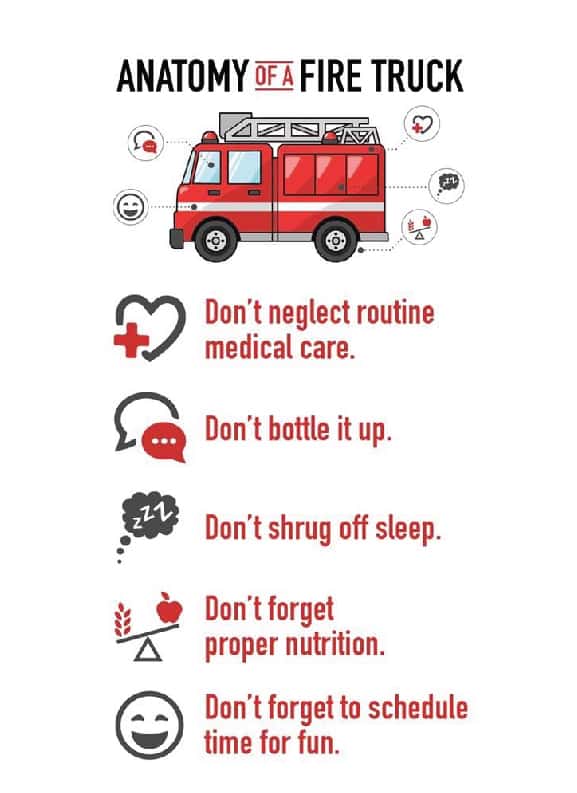Author: IAFF Staff
August 28, 2017
It’s the start of another shift. Like any other, you begin by checking the apparatus. Fuel level — check. Oil level — check. Tire pressure — check. SCBA, PPE, radio — all good. You know this inspection is critical. Your life, the safety of your crew and the public you serve all depend on this equipment.
But what about you? When was the last time you performed a comprehensive inspection on yourself? To operate at peak level, ensure you are there for your crew and the public, and return home to your loved ones, you can’t disregard the systems that help you work safely and effectively. Some of the most important personal systems you should routinely check include:
- Physical Health. The firetruck you ride to respond to emergencies needs regular maintenance. Your body is no different. Repeated exposure to heat, carbon monoxide and other toxic agents places you at increased risk for heart disease, cancer and chronic respiratory problems. Routine visits with your doctor or specialist can detect and treat preventable and curable health conditions. Delaying annual medicals, preventative screenings or other health care needs may save time today, but could cost you greatly in the long run.
- Mental Health. The desire to ignore, suppress or hide your experiences as a fire fighter is understandable. You may struggle to put your emotions into words, assume family cannot understand or fear the judgment of your seemingly invincible peers at the station. But holding on to distressing thoughts, feelings and experiences takes a tremendous toll on your overall health and puts you at increased risk for psychological and substance abuse disorders. If talking to a friend, spouse or chaplain is overwhelming, try to pursue other channels of expression, such as journaling or contacting your EAP or Peer Support Team. Any little bit helps.
- Rest. Healthcare experts advocate that fire fighters need a fundamental attitude shift to view sleep as essential to job preparedness. While overtime pay is enticing, the short-term and long-term costs of sleep deprivation aren’t worth it. Whenever possible, practice good sleep hygiene. Take naps, eliminate stimulating devices or sounds, sleep on a comfortable mattress and limit alcohol consumption close to bedtime.
- Nutrition. A well-balanced diet is essential to maintaining the health, stamina and immune system needed to be an effective emergency responder. Literature suggests that fire fighters — much like the average population — consume too many super-sized snacks and beverages, while skimping on fruits, vegetables and complex carbohydrates that provide essential nutrients. Achieving optimal nutrition includes starting each day with a healthy breakfast, consuming three to five servings of vegetables, eating smaller meals, choosing whole grains over refined alternatives and substituting water for juice and soda.
- Fun. Yes, fun. When called daily to respond to life-and-death emergencies, it may seem like a frivolous use of your time to play the guitar, take your family on vacation or connect with a forgotten hobby. But your healthcare provider would likely disagree. Pursuing pleasurable activities outside of work not only fosters self-esteem and social cohesion, but offers a necessary distraction from the acute stress of emergency response work.

As a fire fighter, making time to maintain good mental and physical health isn’t easy — but it’s worth it. If you or someone you know has turned to drinking or drugs to cope with the daily stress of life-and-death work, The IAFF Center of Excellence is here to help. Reach out to an intake coordinator today for more information.
If you’re struggling with substance abuse or PTSD, you’re not alone. The IAFF Center of Excellence for Behavioral Health Treatment and Recovery has helped countless fire fighters work through substance use disorders and the co-occurring conditions that often drive them. Admitting you have a problem is the first step to starting over, and asking for help is a true act of bravery. Reach out and speak to an intake coordinator today.
Medical Disclaimer: The IAFF Center of Excellence aims to improve the quality of life for people struggling with a substance use or mental health disorder with fact-based content about the nature of behavioral health conditions, treatment options and their related outcomes. We publish material that is researched, cited, edited and reviewed by licensed medical professionals. The information we provide is not intended to be a substitute for professional medical advice, diagnosis or treatment. It should not be used in place of the advice of your physician or other qualified healthcare provider.
